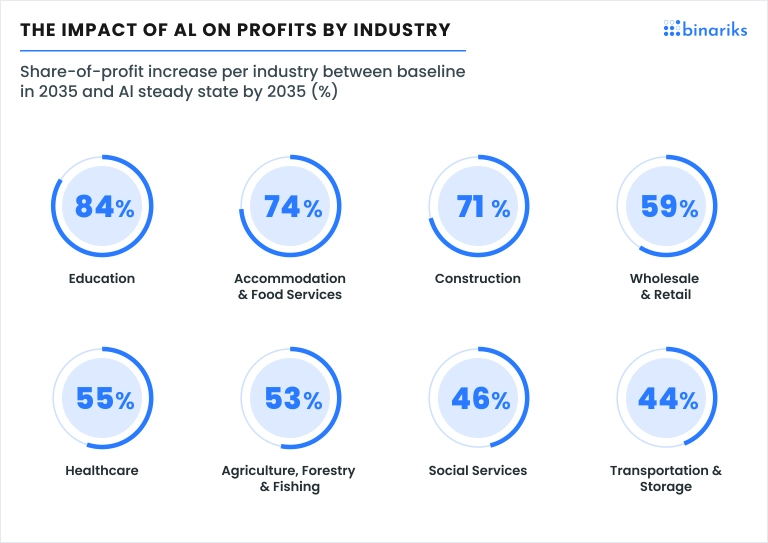Have you ever encountered a distressing situation where a spreadsheet failure results in the loss of a carefully prepared production schedule? Or perhaps you have dealt with the frustrating reality of an unexpected delay in a critical shipment, leaving you to urgently address dissatisfied customers.
Operations management often feels like a complex challenge, with issues such as inventory errors, logistics delays, inefficient workflows, and human mistakes. Such obstacles can be demanding enough to test even the most experienced operations manager.
However, there's a transformative solution on the horizon: artificial intelligence. This once-fictional technology is now ready to significantly enhance your operational strategies. At Binariks, we're prepared to guide you through integrating AI into your operations , regardless of the industry.
We will showcase the potential of AI in operations management and its practical applications, providing insights on leveraging this advanced technology to transform your business.
Core benefits of AI in operations management
According to Deloitte's State of AI in the Enterprise, 94% of business leaders believe AI will be crucial for success within the next five years. PwC's Global Artificial Intelligence Study forecasts that AI technology could add a further $15.7 trillion to the global economy by 2030.

But how exactly does AI swoop in and save the day? Here's a breakdown of the superpowers that make AI a perfect tool for almost any business .
- Efficiency: By automating repetitive processes, AI frees your team to focus on higher-level strategic thinking, like conquering new markets or creating new products and services that enhance customer satisfaction and drive growth.
- Prediction: AI for operations boasts some serious fortune-telling skills. By analyzing vast amounts of data, AI can predict equipment failures, demand fluctuations, and even potential supply chain disruptions. This foresight allows you to be proactive instead of reactive, saving you time, money, and stress.
- Optimization: AI can analyze every process, identify bottlenecks, and suggest ways to streamline your workflow for maximum efficiency. Think of faster production times, reduced costs, and happier customers who get their products quicker.
- Quality control: AI can act as a hawk-eyed quality control inspector, consistently monitoring production lines and identifying defects before they become a more significant issue. This ensures consistent product quality, reduces waste, and keeps customer satisfaction ratings soaring.
- Decision-making : AI excels at data analysis. It harnesses these insights to provide real-time recommendations for optimizing your operations. Using AI in operations management, you can avoid relying on intuition or guesswork. Instead, you'll be equipped to make decisions based on solid data, ensuring smoother and more efficient operational processes.
These are just a few ways operations management and AI can work together. In the next section, we'll delve into some of the specific applications of AI that are taking businesses to the next level.
5 applications of AI in business operations management
Now that we've discussed AI's capabilities, let's examine its practical use cases. Here are five AI applications in operations management transforming businesses worldwide.
1. Dynamic pricing
Generative AI in back office operations can significantly enhance them by streamlining tasks such as data entry, improving fraud detection, optimizing human resources processes, and more.
For example, given how unpredictable customer behavior can be, AI's capabilities are particularly impactful in pricing strategies. AI can recommend dynamic pricing models by analyzing real-time market data, customer preferences, and competitor pricing.
These models automatically adjust prices based on demand fluctuations – raising prices during peak seasons and reducing them in slower periods – without the need for manual intervention.
2. Smart forecasting and replenishment
Have you ever ended up with a warehouse overflowing with fidget spinners while fidget cubes are the hot new trend? Substitute any comparable example from your industry: artificial intelligence in production management can prevent such inventory nightmares.
AI can predict future demand for your products through intelligent forecasting models, ensuring you have the right amount of stock on hand to meet customer needs without unnecessary stockpiling.
3. Streamlined recruitment and onboarding
AI operations management can also be a game-changer in human resources. AI can automate tedious tasks by screening resumes and conducting initial interviews via chatbots, freeing up HR professionals to focus on more strategic initiatives.
Besides, AI can help enable a personalized onboarding experience for new hires, ensuring they feel welcome, informed, and ready to hit the ground running from day one.
4. Boosted collaboration
Communication breakdowns can be a significant roadblock in any organization. However, AI-powered communication platforms can help bridge the gap by translating languages in real time, thus facilitating collaboration between teams worldwide.
This fosters a more connected and efficient work environment where everyone is on the same page.
5. Chatbots and virtual assistants
And one more about collaboration. Customer service is no longer a nine-to-five game. Customers expect instant answers and support 24/7. AI-powered chatbots and virtual assistants can be your secret weapon for providing exceptional customer service around the clock.
These tools can answer frequently asked questions, resolve simple issues, and even schedule appointments, enabling your human customer service representatives to handle more complex inquiries. It's a win-win for everyone – customers get the support they need, and your team can focus on providing personalized service.
Take your software to new heights with AI and ML services
The best AI tools for operations management
In this block, we will examine three popular AI-based tools that are currently making waves in operations management.
IBM Maximo Application Suite
This comprehensive suite goes beyond traditional computerized maintenance management systems (CMMS) by leveraging AI for predictive maintenance.
IBM Maximo AI-powered inspection software analyzes sensor data from equipment to identify early warning signs of impending failures. Basically, machinery alerts you in advance for a tune-up.
This proactive approach reduces downtime and ensures your operations continue seamlessly, thus saving time and costs associated with reactive repairs.
Oracle Intelligent Business Cloud
This cloud-based platform offers a comprehensive suite of AI-powered tools to tackle various operations management challenges. OIB utilizes machine learning to optimize your supply chain through demand forecasting and inventory management.
It also boasts intelligent automation capabilities that streamline workflows and free your team to focus on higher-level tasks. Additionally, OIB provides valuable business insights derived from data analysis, empowering you to make data-driven decisions for continuous improvement.
Workday Adaptive Planning
Workday Adaptive Planning applies AI to financial tasks. This powerful tool leverages machine learning to create more accurate forecasts, identify potential financial risks before they arise, and recommend data-driven adjustments to optimize financial performance.
It functions like a predictive tool for your budget, enabling you to confidently manage the financial aspects of your operations and maintain fiscal health.
The key is identifying your specific needs and finding the tool that best addresses them. Binariks can help you navigate this exciting landscape and choose the perfect tools. Contact us today , and let's supercharge your business operations!
Implementing AI solutions in operations management
So, now you know that AI is the key. But how exactly do you go about implementing these solutions into your business? Here's a roadmap to guide you through the process.
Step 1: Define your goals and needs
Before diving headfirst into the pool of artificial intelligence in operations management, take a step back and assess your current state. What are your biggest pain points? Where can AI have the most significant impact? Are you looking to optimize your supply chain, improve quality control, or streamline financial planning? Defining your goals will help you choose the right AI tools and ensure a smooth implementation process.
Step 2: Assemble your team
AI is a powerful tool, but it's not magic. Successful implementation requires buy-in from all levels of your organization. Educate your team on the benefits of AI and how it will augment, not replace their roles. Foster a collaborative environment where employees feel comfortable providing feedback and participating in the AI adoption process.
Step 3: Select the right AI tools
Remember those excellent AI tools we discussed earlier? This is where they come in! Once you've identified your goals, research different AI solutions and select the ones that best address your needs. When choosing, consider factors like scalability, ease of use, and integration capabilities.
Step 4: Prepare your data infrastructure
AI thrives on data. The quality and quantity of your data will significantly impact the success of your AI implementation. Ensure your data is clean, consistent, and organized for optimal AI performance. This might involve data cleansing, establishing data governance policies, and investing in data storage solutions.
Step 5: Start small, scale smart
Begin with a pilot project focusing on a specific area of your operations. This allows you to test the waters, identify challenges, and refine your approach before scaling up. As you gain experience and confidence, you can gradually introduce AI into other parts of your business.
By following these steps and partnering with a reliable AI implementation expert like Binariks, you can successfully integrate AI into your operations management and unlock a new era of efficiency, productivity, and profitability.
Overcoming challenges in AI adoption
Implementing AI-powered operations management can present some challenges. Here are some common issues you might face and how Binariks can assist you in overcoming them:
Challenge 1: Disorganized data
AI is all about data, and poor data input can compromise the output. If your data is inconsistent, incomplete, or disorganized, your AI solution will struggle to perform optimally. Binariks can assist you in cleaning, organizing, and structuring your data to ensure a successful AI implementation. This preparation is crucial for maximizing the effectiveness of your AI systems.
Challenge 2: Integration into existing systems
Merging AI with existing systems can be intricate. Binariks provides expertise in seamless integration, ensuring that AI tools effectively communicate with your current infrastructure.
Challenge 3: Workflow disruption
It is normal that adopting new technologies can disrupt existing workflows. Binariks addresses this challenge by supporting your team through comprehensive change management practices.
We facilitate a smooth transition to advanced AI operations by providing user training, designing user guides and manuals, and sharing knowledge with your IT team.
Challenge 4: Cost management
Implementing AI solutions can come with a substantial price tag, but it's an investment in the future of your operations. Binariks can help you navigate this financial challenge by identifying the most impactful areas for AI integration.
By prioritizing these key segments, we ensure cost-effective implementation, avoiding the pitfalls of widespread deployment without strategic planning. This approach optimizes costs and maximizes the benefits, ensuring a smarter allocation of your investment.
AI solutions require specialized skills for both implementation and maintenance. Binariks boasts experienced business analysts, architects, and AI software engineers who can handle the entire process, from selecting the right tools to ensuring seamless integration. Additionally, Binariks offers dedicated development team services, which may be an excellent option for accommodating your project's evolving needs.
Final thoughts
Artificial intelligence is no longer a futuristic concept; it is a potent tool that can transform your business operations. By adopting AI, you can enhance efficiency, streamline workflows, optimize processes, and achieve a significant competitive advantage.
However, AI is not a panacea. Successful implementation requires meticulous planning, a supportive organizational culture, and clean, well-structured data.
If you are ready to elevate your operations management, Binariks is here to assist. We provide a comprehensive range of services, including selecting appropriate AI tools, ensuring seamless integration, and offering continuous support. Together, we can transform your business and maximize its potential.
Share

